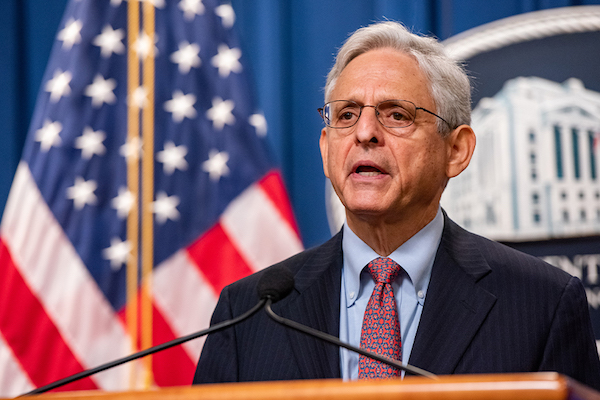SEJournal Online is the digital news magazine of the Society of Environmental Journalists. Learn more about SEJournal Online, including submission, subscription and advertising information.
 |
 |
| New Justice Department regulations formalize guidelines that prevent it from seizing a reporter’s notebooks or forcing them to reveal sources. Above, DOJ Attorney General Merrick Garland earlier this year. Photo: Department of Justice. |
WatchDog Opinion: On Reporter’s Privilege, Justice Department Takes a Step Forward
By Joseph A. Davis
Journalists got some good news (may require subscription) in late October when the Justice Department published a rule saying the government could not seize their notebooks or force them to name sources.
And it really was good news, considering the years of struggle journalism groups have waged over this issue. As well as the many times journalists have gone to jail to protect sources.
But is it enough?
Attorney General Merrick Garland’s action formalized and gave legal effect to what had hitherto been more like … guidelines. The Justice Department published it as an official federal regulation and decreed in an all-hands memo that it is departmental policy. Regulations often have the force of law (although they are not).
Confidentiality requires greater protections
At stake is what some call “reporter’s privilege.” Lawyers are normally protected from disclosing conversations with their clients. Doctors and priests can keep secret what they hear from patients or penitents in the confessional. Not reporters.
The confidentiality of reporters’ conversations with their sources is viewed by many journalists as something protected by the First Amendment. It should be protected — but is not.
In the Branzburg v. Hayes case that went to the
Supreme Court back in 1972, it ruled that there
is no constitutional basis for a reporter’s privilege.
Some remember the Branzburg v. Hayes case that went to the Supreme Court back in 1972. The court ruled in that case that there is no constitutional basis for a reporter’s privilege. It was a paper-thin 5-4 decision.
In the years since (and even before then), many states have enacted or recognized state laws establishing a shield against compelled testimony (e.g., before a grand jury). The laws vary. Some are strong and some have exceptions. But the number is at least 40 states plus the District of Columbia. Some put the number as high as 48, depending on how you count. It is a good thing we have lawyers like those at the Reporters Committee for Freedom of the Press to keep track.
Shield law not always a partisan concern
Congress could create a federal shield law by passing a bill. This hasn’t always been a partisan, or left-right, issue. None other than former Vice President Mike Pence (R-Ind.) introduced one as far back as 2005, when he was still in Congress. Even in the current time frame, bills to set a federal shield law have been bipartisan. A shield bill introduced by Jamie Raskin (D-Md.) passed the House by voice vote in September 2022.
But it’s stuck in the Senate.
There’s a long history of the effort to get a shield law through that body. It came very close in 2009 during the Obama years, and the WatchDog reported on that. The Society of Environmental Journalists joined other journalism groups taking an official position favoring a shield law as early as 2004.
Historically, the opposition to a federal shield law has come from national security agencies within the federal government — which have influenced the White House position.
The new Justice Department regulation may prevent jailing of close-mouthed reporters — at least as long as the Biden administration controls the DOJ.
The regulation states: “The Department of Justice will not use compulsory legal process for the purpose of obtaining information from or records of members of the news media acting within the scope of newsgathering.” Which is good, except that there are exceptions for situations involving terrorism, imminent threat to public safety, etc.
A full federal shield law could go further than this.
More importantly, once in law, it would stand a
better chance of surviving a change of administrations.
A full federal shield law could go further than this. More importantly, once in law, it would stand a better chance of surviving a change of administrations. And it would overcome the Supreme Court legal precedent in Branzburg.
The House-passed federal shield bill still sits today before the Democratic-controlled Senate — which could act to make it law during the lame-duck session. Or the Raskin bill could be passed again by the next Congress. And should be. But will it? That’s hard to foresee, given the potential chaos of a GOP-run House. Stay tuned!
[Editor’s Note: Read more WatchDog reporting on this issue, plus get freedom of information resources and learn more about the SEJ's actions advocating access to environmental information — and supporting the media's right to know on behalf of the public.]
Joseph A. Davis is a freelance writer/editor in Washington, D.C. who has been writing about the environment since 1976. He writes SEJournal Online's TipSheet, Reporter's Toolbox and Issue Backgrounder, and curates SEJ's weekday news headlines service EJToday and @EJTodayNews. Davis also directs SEJ's Freedom of Information Project and writes the WatchDog opinion column.
* From the weekly news magazine SEJournal Online, Vol. 7, No. 42. Content from each new issue of SEJournal Online is available to the public via the SEJournal Online main page. Subscribe to the e-newsletter here. And see past issues of the SEJournal archived here.










 Advertisement
Advertisement 


